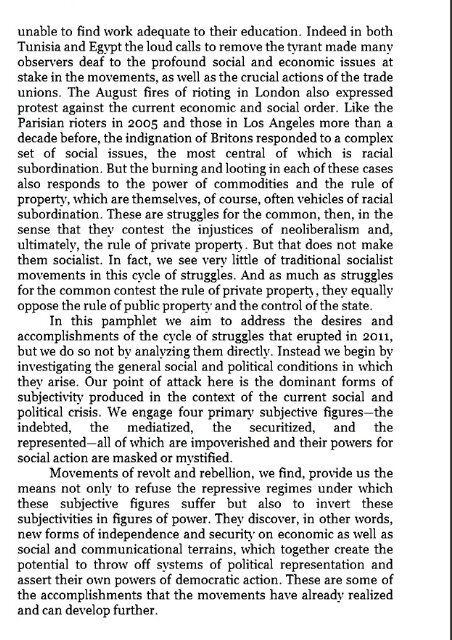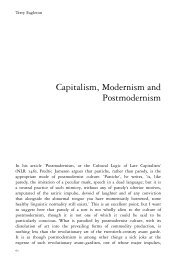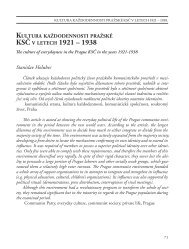Chapter 1: Subjective Figures of the Crisis ... - Negri in English
Chapter 1: Subjective Figures of the Crisis ... - Negri in English
Chapter 1: Subjective Figures of the Crisis ... - Negri in English
You also want an ePaper? Increase the reach of your titles
YUMPU automatically turns print PDFs into web optimized ePapers that Google loves.
unable to f<strong>in</strong>d work adequate to <strong>the</strong>ir education. Indeed <strong>in</strong> both<br />
Tunisia and Egypt <strong>the</strong> loud calls to remove <strong>the</strong> tyrant made many<br />
observers deaf to <strong>the</strong> pr<strong>of</strong>ound social and economic issues at<br />
stake <strong>in</strong> <strong>the</strong> movements, as well as <strong>the</strong> crucial actions <strong>of</strong> <strong>the</strong> trade<br />
unions. The August fires <strong>of</strong> riot<strong>in</strong>g <strong>in</strong> London also expressed<br />
protest aga<strong>in</strong>st <strong>the</strong> current economic and social order. Like <strong>the</strong><br />
Parisian rioters <strong>in</strong> 2005 and those <strong>in</strong> Los Angeles more than a<br />
decade before, <strong>the</strong> <strong>in</strong>dignation <strong>of</strong> Britons responded to a complex<br />
set <strong>of</strong> social issues, <strong>the</strong> most central <strong>of</strong> which is racial<br />
subord<strong>in</strong>ation. But <strong>the</strong> burn<strong>in</strong>g and loot<strong>in</strong>g <strong>in</strong> each <strong>of</strong> <strong>the</strong>se cases<br />
also responds to <strong>the</strong> power <strong>of</strong> commodities and <strong>the</strong> rule <strong>of</strong><br />
property, which are <strong>the</strong>mselves, <strong>of</strong> course, <strong>of</strong>ten vehicles <strong>of</strong> racial<br />
subord<strong>in</strong>ation. These are struggles for <strong>the</strong> common, <strong>the</strong>n, <strong>in</strong> <strong>the</strong><br />
sense that <strong>the</strong>y contest <strong>the</strong> <strong>in</strong>justices <strong>of</strong> neoliberalism and,<br />
ultimately, <strong>the</strong> rule <strong>of</strong> private property'. But that does not make<br />
<strong>the</strong>m socialist. In fact, we see very little <strong>of</strong> traditional socialist<br />
movements <strong>in</strong> this cycle <strong>of</strong> struggles. And as much as struggles<br />
for <strong>the</strong> common contest <strong>the</strong> rule <strong>of</strong> private property', <strong>the</strong>y equally<br />
oppose <strong>the</strong> rule <strong>of</strong> public property' and <strong>the</strong> control <strong>of</strong> <strong>the</strong> state.<br />
In this pamphlet we aim to address <strong>the</strong> desires and<br />
accomplishments <strong>of</strong> <strong>the</strong> cycle <strong>of</strong> struggles that erupted <strong>in</strong> 2011,<br />
but we do so not by analyz<strong>in</strong>g <strong>the</strong>m directly. Instead we beg<strong>in</strong> by<br />
<strong>in</strong>vestigat<strong>in</strong>g <strong>the</strong> general social and political conditions <strong>in</strong> which<br />
<strong>the</strong>y arise. Our po<strong>in</strong>t <strong>of</strong> attack here is <strong>the</strong> dom<strong>in</strong>ant forms <strong>of</strong><br />
subjectivity produced <strong>in</strong> <strong>the</strong> context <strong>of</strong> <strong>the</strong> current social and<br />
political crisis. We engage four primary subjective figures—<strong>the</strong><br />
<strong>in</strong>debted, <strong>the</strong> mediatized, <strong>the</strong> securitized, and <strong>the</strong><br />
represented—all <strong>of</strong> which are impoverished and <strong>the</strong>ir powers for<br />
social action are masked or mystified.<br />
Movements <strong>of</strong> revolt and rebellion, we f<strong>in</strong>d, provide us <strong>the</strong><br />
means not only to refuse <strong>the</strong> repressive regimes under which<br />
<strong>the</strong>se subjective figures suffer but also to <strong>in</strong>vert <strong>the</strong>se<br />
subjectivities <strong>in</strong> figures <strong>of</strong> power. They discover, <strong>in</strong> o<strong>the</strong>r words,<br />
new forms <strong>of</strong> <strong>in</strong>dependence and security' on economic as well as<br />
social and communicational terra<strong>in</strong>s, which toge<strong>the</strong>r create <strong>the</strong><br />
potential to throw <strong>of</strong>f systems <strong>of</strong> political representation and<br />
assert <strong>the</strong>ir own powers <strong>of</strong> democratic action. These are some <strong>of</strong><br />
<strong>the</strong> accomplishments that <strong>the</strong> movements have already realized<br />
and can develop fur<strong>the</strong>r.










